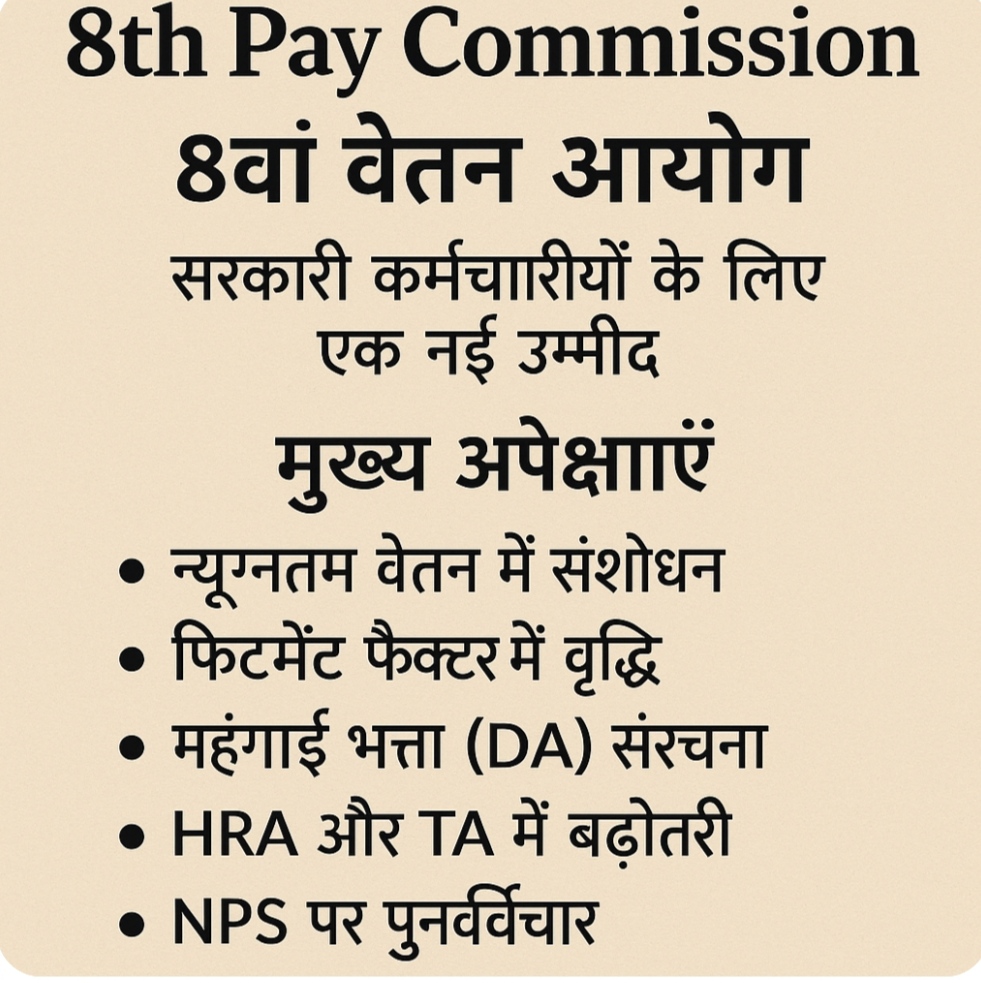8th Pay Commission: A new hope for government employees
It is the dream of every government employee that their salary, allowances and retirement benefits should improve with time. The work of realising this dream is done by the Pay Commission, whose proposal and implementation is done every few years. Today we will talk about the 8th Pay Commission – its expectations, recommendations, and its potential impact.
What is Pay Commission?
Pay Commission is a government appointed body that reviews the salary structure, allowances, and retirement benefits of central government employees. This commission is formed after some time so that salaries can be updated according to changing economic conditions, inflation, and cost of living.
Till now 7 pay commissions have been passed. Each one has brought new standards and financial improvements. 7th Pay Commission came into effect from 1 January 2016, and now everyone is waiting for 8th Pay Commission.
Why is there a need for the 8th Pay Commission?
The implementation of the 7th Pay Commission will take 9 years. During this time, inflation, lifestyle costs, and financial needs have increased a lot. Let us understand why the 8th Pay Commission is necessary:
Impact of inflation: Prices are increasing every year, but salaries remain the same.
Gap in comparison to private sector: There are regular increments in private jobs, while government employees get a fixed structure.
Difficulties of pensioners: After closure of old pension scheme, new employees come under NPS, which has uncertain returns.
Motivation and productivity: Better salary structure will keep the employees more motivated, which will be reflected in their productivity.
Expected Timeline of 8th Pay Commission Till now the government has not officially announced the formation of 8th Pay Commission. But if we look at the historical pattern:
6th Pay Commission: Implemented in 2006
7th Pay Commission: Implemented in 2016
So the 8th Pay Commission is expected to be implemented around 2026.
Many unions and government employee associations had demanded its announcement in the 2024 budget, but no official notice has come till now.
What can be the expectations from 8th Pay Commission? There are some major expectations from the side of government employees:
Revision of Minimum Salary:At present the minimum salary on the basis of salary is ₹18,000 (7th CPC).It is expected to increase to ₹26,000 – ₹30,000 in the 8th Pay Commission.
Revision of Fitment Factor:7th CPC had kept the fitment factor at 2.57.Employees are demanding that it be increased to 3.68.
Dearness Allowance (DA) structure:DA is revised timely according to inflation.By merging DA in 8th CPC, the base of new pay structure can be made.
Increase in HRA and TA:Housing and travelling cost has increased considerably in metro and non-metro cities.Revision of these allowances is also expected.
Reconsideration on NPS:Many employees want the Old Pension Scheme (OPS) to be brought back.There may be a demand in the 8th Pay Commission to make NPS more secure or to bring back elements of OPS.
Impact of 8th Pay Commission on Economy The implementation of 8th Pay Commission is not limited to only government employees. It has a major impact on the entire economy:
Increase in Consumer Spending: When salaries increase, people spend more, which increases market demand.
Inflation pressure: There is a risk of inflation increasing to some extent due to more money coming into the market.
Impact on Fiscal Deficit: Government expenses increase, which can increase fiscal deficit.
Private Sector Salaries: Private companies also revise salaries to make their packages competitive.
Demands and struggle of government employees So far, several unions have raised the demand for 8th Pay Commission through rallies, petitions and RTI. They say:
Inflation has doubled after 7th CPC.
Fitment factor is inadequate.
Retirement benefits and NPS should be revised.
Salary structure should be realistic and match the ground reality.
Challenges in Implementation Whenever a new Pay Commission is implemented, there are some challenges:
Huge Financial Outlay: An additional burden of crores of rupees falls on the government.
Political Will: Such decisions get delayed during elections or due to fiscal pressure.
Centre-State Coordination: State governments also apply similar structure for their employees, which impacts their finances.
Will the 8th Pay Commission be replaced by a performance-based system? There have been many suggestions that a performance-based pay system should be implemented in place of a fixed pay structure. But there is still a lot of debate on this model:
Advantages:
Efficient and hardworking employees get rewarded.
The quality of public services improves.
Disadvantages:
Danger of bureaucratic favoritism.
Subjective evaluation system can be unfair.
Transparency and accountability in the government system is already a challenge.
Therefore, there are high chances that the 8th CPC will be based on the traditional model, with some modern tweaks
Conclusion: 8th Pay Commission is not just a mechanism for salary revision—it is a platform linked to the aspirations, financial stability and social security of crores of government employees. Whenever it is announced, it will be a major financial and political decision. Every government employee is hopeful that this new commission will improve their standard of living and give due respect to their service.
Disclaimer: This article is written for information and general discussion purposes only. The views, expectations and suggestions expressed are author’s own and have nothing to do with any government policy or official announcement. The financial estimates and timeline given in the article are based purely on general assessment. Readers must review official sources and notifications before taking their own decision. Only official documents of the Government of India should be considered for final details of any kind of policy, salary structure or allowance.







Post Comment